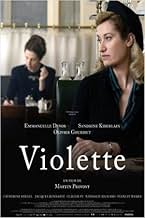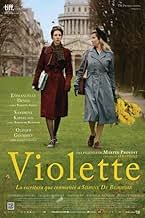AVALIAÇÃO DA IMDb
6,8/10
2,2 mil
SUA AVALIAÇÃO
No início dos anos 20, a escritora Violette Leduc encontra a filósofa Simone de Beauvoir e nasce entre as duas uma amizade, ao mesmo tempo que Simone encoraja Violette a escrever mais, abord... Ler tudoNo início dos anos 20, a escritora Violette Leduc encontra a filósofa Simone de Beauvoir e nasce entre as duas uma amizade, ao mesmo tempo que Simone encoraja Violette a escrever mais, abordando detalhes da intimidade feminina.No início dos anos 20, a escritora Violette Leduc encontra a filósofa Simone de Beauvoir e nasce entre as duas uma amizade, ao mesmo tempo que Simone encoraja Violette a escrever mais, abordando detalhes da intimidade feminina.
- Direção
- Roteiristas
- Artistas
- Prêmios
- 1 vitória e 1 indicação no total
- Direção
- Roteiristas
- Elenco e equipe completos
- Produção, bilheteria e muito mais no IMDbPro
Avaliações em destaque
Emmanuelle Devos is fully committed in this role, and Sandrine Kiberlain cannily underplays hers. Not to be missed.
The beginning is great: Violette is living with Maurice Sachs in a Normandy backwater in 1942. With the war on, life is precarious for the budding writer; she is forced to go on the black market to deal in the essentials of life. Sachs obliges her to sit down and write about her childhood and youth, as a way to bring in some extra cash. Soon Sachs is off to Germany as a labourer (he hoped to ingratiate himself with the Nazis by hiding his Jewish past). Sachs dies, and Violette is off to Paris as soon as she can manage it. Soon she meets Simone de Beauvoir, Jean Genet and Jacques Guerin (who becomes her first publisher). She starts to travel, something a girl from a poor family usually doesn't get to do. Finally she becomes a member of the Gallimard stable of writers; fame and some fortune are hers at last.
Emmanuelle Devos impressed me very much with her tenacity in bad times and her masochistic devotion to Beauvoir. Sandrine Kiberlain, reed-thin and erect of bearing, looked and sounded very much like Beauvoir. Olivier Py as the sleazy Sachs stole all his scenes.
Emmanuelle Devos impressed me very much with her tenacity in bad times and her masochistic devotion to Beauvoir. Sandrine Kiberlain, reed-thin and erect of bearing, looked and sounded very much like Beauvoir. Olivier Py as the sleazy Sachs stole all his scenes.
The French film Violette (2013) was directed by Martin Provost. It tells the story of Violette LeDuc, who's was considered an important feminist author in the postwar period, but who is now largely forgotten except by feminist scholars.
When the film opens, Violette (played by Emmanuelle Devos) is running from the police. We assume that she's wanted by the Gestapo, but, in fact, she is just caught hiding some black-market food, for which she spends a few days in prison.
Eventually, after the war, LeDuc goes to Paris, where she is befriended by Simone de Beauvoir (played by Sandrine Kiberlain). LeDuc is introduced to de Beauvoir's circle-- Sartre, Camus, Genet. LeDuc began to write--mainly semi-autobiographic novels--that attained some popularity, despite being heavily censored. The censorship was due to the lesbian content, as well as the graphic sexuality. (Tame subjects now, but not in post-war France.)
I didn't enjoy this movie much. Violette, as portrayed in the film, wasn't really a fascinating character. The movie ran for over two hours, with too many scenes of discussions in publishers' offices. I thought the best component of the film was Kiberlain's portrayal of Simone de Beauvoir. Her Beauvoir was beautiful in a non-traditional way, and very forceful and direct. Despite the title of the movie, the screen didn't light up when LeDuc was portrayed. For me, Beauvoir was the character who was truly at the center of the movie.
We saw this film at the Little Theatre, as part of ImageOut, the admirable Rochester LGBT Film Festival. It will work well on DVD.
When the film opens, Violette (played by Emmanuelle Devos) is running from the police. We assume that she's wanted by the Gestapo, but, in fact, she is just caught hiding some black-market food, for which she spends a few days in prison.
Eventually, after the war, LeDuc goes to Paris, where she is befriended by Simone de Beauvoir (played by Sandrine Kiberlain). LeDuc is introduced to de Beauvoir's circle-- Sartre, Camus, Genet. LeDuc began to write--mainly semi-autobiographic novels--that attained some popularity, despite being heavily censored. The censorship was due to the lesbian content, as well as the graphic sexuality. (Tame subjects now, but not in post-war France.)
I didn't enjoy this movie much. Violette, as portrayed in the film, wasn't really a fascinating character. The movie ran for over two hours, with too many scenes of discussions in publishers' offices. I thought the best component of the film was Kiberlain's portrayal of Simone de Beauvoir. Her Beauvoir was beautiful in a non-traditional way, and very forceful and direct. Despite the title of the movie, the screen didn't light up when LeDuc was portrayed. For me, Beauvoir was the character who was truly at the center of the movie.
We saw this film at the Little Theatre, as part of ImageOut, the admirable Rochester LGBT Film Festival. It will work well on DVD.
Violette (2013)
Violette Leduc was a French novelist who approached female sensual and sexual subjects, including lesbian affairs, with fresh and original directness. This is one story of her life. portrayed as largely tormented and often filled with a sense of hopelessness. Her writing and her love life was constantly ravaged.
But this all happens in beautiful France, so the movie is a gorgeous meandering journey through the 20th Century in pastel, gloomy, golden, timeless countryside. And in the end, for those who care about the real woman, she overcomes. Her death to breast cancer (not in the movie) is just the sad inevitable darkness that seemed to follow her even during the brightness of a great and daring mind.
There is no strong narrative propulsion here, for sure. To like this you'll have to enjoy lingering, and sometime in zones of brown melancholy. I did like that, and liked all of the movie, even if I found myself physically restless, too. I can't see how it could have been done differently, but it's good to have poetic patience (or patience for poetry).
The acting, it must be emphasized, is vivid and raw in a modernist way not far from the many bits of text taken from Leduc's writing. Emmanuelle Davos makes no compromise in her showing both the deeply unhappy and the hopeful sides of this woman. And Sandrine Kaberlain is a severe and knowing Simone de Beauvoir, the famous author who comes again and again to Leduc's aid. The implied love affair, fractured and incomplete, between these two is an important if somewhat thinly sketched part of the larger picture for the title character.
This is all moving, great stuff. There is an echo (or a harbinger) of another pair of women drawn with artistry and love in a recent movie, "Reaching for the Moon" (which I liked a lot). But such a different ambiance here, all dank and fearful with shafts of sunlight only sometimes felt. I recommend them both, but this one will require slowing down and appreciating the mood as much as the details of this intense, ordinary biography.
Violette Leduc was a French novelist who approached female sensual and sexual subjects, including lesbian affairs, with fresh and original directness. This is one story of her life. portrayed as largely tormented and often filled with a sense of hopelessness. Her writing and her love life was constantly ravaged.
But this all happens in beautiful France, so the movie is a gorgeous meandering journey through the 20th Century in pastel, gloomy, golden, timeless countryside. And in the end, for those who care about the real woman, she overcomes. Her death to breast cancer (not in the movie) is just the sad inevitable darkness that seemed to follow her even during the brightness of a great and daring mind.
There is no strong narrative propulsion here, for sure. To like this you'll have to enjoy lingering, and sometime in zones of brown melancholy. I did like that, and liked all of the movie, even if I found myself physically restless, too. I can't see how it could have been done differently, but it's good to have poetic patience (or patience for poetry).
The acting, it must be emphasized, is vivid and raw in a modernist way not far from the many bits of text taken from Leduc's writing. Emmanuelle Davos makes no compromise in her showing both the deeply unhappy and the hopeful sides of this woman. And Sandrine Kaberlain is a severe and knowing Simone de Beauvoir, the famous author who comes again and again to Leduc's aid. The implied love affair, fractured and incomplete, between these two is an important if somewhat thinly sketched part of the larger picture for the title character.
This is all moving, great stuff. There is an echo (or a harbinger) of another pair of women drawn with artistry and love in a recent movie, "Reaching for the Moon" (which I liked a lot). But such a different ambiance here, all dank and fearful with shafts of sunlight only sometimes felt. I recommend them both, but this one will require slowing down and appreciating the mood as much as the details of this intense, ordinary biography.
The first thing that impresses is that this film is written very well. The structure is quite novelistic, separated into chapters and each part moving the story along in well paced increments. The whole movie starts quite slowly, mysteriously and then opens out, that is a pleasing form as it adds layers to the work.
The second thing is that both Kiberlain and Devos are outstanding. Devos takes this role of Violette and makes it completely human. She is a dozen conflicted people and all the time in need of many things but most of all, in need of love. As de Beauvoir, Kiberlain is magisterial. She has de Beauvoir's haughtiness, her brilliance, her perfect sense of her own destiny.
The relationship between the women of such different circumstances is told with grace and balance and insight.
The photography and choice of locales is good too. The sense of place is considered, from the cold farm in winter, through to freezing Paris and then the Midi in summer at the end. Some shots may linger, because it can look so good on the screen, but that remark apart there is little to fault here.
Recommended for all its best virtues.
The second thing is that both Kiberlain and Devos are outstanding. Devos takes this role of Violette and makes it completely human. She is a dozen conflicted people and all the time in need of many things but most of all, in need of love. As de Beauvoir, Kiberlain is magisterial. She has de Beauvoir's haughtiness, her brilliance, her perfect sense of her own destiny.
The relationship between the women of such different circumstances is told with grace and balance and insight.
The photography and choice of locales is good too. The sense of place is considered, from the cold farm in winter, through to freezing Paris and then the Midi in summer at the end. Some shots may linger, because it can look so good on the screen, but that remark apart there is little to fault here.
Recommended for all its best virtues.
Você sabia?
- Trilhas sonorasFratres for strings and percussion
Composed by Arvo Pärt
Performed by Tapiola Sinfonietta, Jean-Jacques Kantorow
Principais escolhas
Faça login para avaliar e ver a lista de recomendações personalizadas
- How long is Violette?Fornecido pela Alexa
Detalhes
- Data de lançamento
- Países de origem
- Central de atendimento oficial
- Idioma
- Também conhecido como
- 盛開紫羅蘭:西蒙波娃與薇奧麗賴朵絲
- Empresas de produção
- Consulte mais créditos da empresa na IMDbPro
Bilheteria
- Faturamento bruto mundial
- US$ 1.493.822
- Tempo de duração2 horas 19 minutos
- Cor
- Mixagem de som
Contribua para esta página
Sugerir uma alteração ou adicionar conteúdo ausente






























